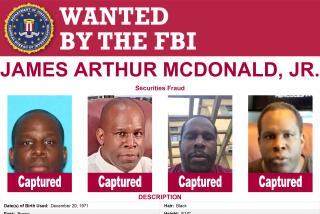$30-Million Investment Fraud Case Goes to Jury : Courts: Two months of testimony conclude in federal case against Morris D. English. He is charged with swindling 1,500 investors through his now-defunct Wellington Group.
- Share via
After more than two months of testimony, a federal court jury will decide whether the leader of a now-defunct South Bay investment firm swindled 1,500 investors out of more than $30 million.
Final arguments concluded this week in U.S. District Court in the fraud and money-laundering trial of Morris D. English, Jr., 46, former head of the Wellington Group investment company.
While about a dozen glaring investors looked on, Assistant U.S. Atty. Jeffrey Isaacs told the jury that investors in English’s company “entrusted a good portion of their life savings to the defendant, and he stole it.” Isaacs said English used some of the money to “live a lifestyle his victims could only dream about,” including expensive homes for himself and family members, private airplanes and other luxuries.
Defense attorney Richard Callahan argued that, although English made mistakes in running his company, he never tried to swindle anybody.
“Mistakes were made here,” Callahan told the jurors. “(English) is the first to admit it.” But he added, “Were his actions criminal? Not on your life--and more importantly, not on his life.”
*
English could be sentenced to 450 years in prison if convicted on all 51 counts in the indictment.
Outside court, some of the investors who lost money, many of them retirees, spoke bitterly of their losses.
“He ruined our lives, our children’s inheritance,” said Eleanor Sturman of Burbank, who said she lost $194,000. “He took away everything a lot of these people had. We’ve got old people who are eating dog food because of him.”
According to prosecutors, the case began in 1984, when English purchased a dormant Manhattan Beach company called Wellington Escrow Corp. for $7,000. English later changed the name to The Wellington Group, moved to Rolling Hills Estates and began making short-term, interest-only loans to borrowers who secured the loans with real estate.
To fund the loans, prosecutors said, English solicited money from investors, promising them a 15% to 16% return on their investment. English advertised on radio and investors from across the country invested millions.
Prosecutors say the company eventually evolved into a classic “Ponzi scheme,” with new investors’ money being used to pay off old investors. Meanwhile, prosecutors allege, English diverted investors’ funds for his personal use.
In 1990 the California Department of Corporations obtained a preliminary injunction to prevent Wellington from selling unqualified securities. The company later filed for bankruptcy, and, according to prosecutors, illegally omitted investors’ names from the list of creditors so the investors wouldn’t find out about it. English also concealed or destroyed numerous records concerning the company, prosecutors charge.
Some investors say they didn’t know anything was wrong until the interest payments on their investments abruptly stopped. By then it was too late to get their money back.
The company’s collapse sparked civil lawsuits involving hundreds of investors. The company has been placed in the hands of a court-appointed trustee who has been selling its remaining assets to pay off investors. Some investors say they may get back 10 or 15 cents on the dollar--if that.
English’s criminal court troubles began in 1991, when he was charged in Torrance with eight counts of grand theft and writing bad checks to investors. In a plea bargain he agreed to make good on the checks, but was later arrested for failing to do so.
Meanwhile, federal agents were investigating his business affairs. English was arrested in May on the federal charges and has been held in federal custody ever since.
Testifying in his own defense, English denied that he ever tried to mislead investors. At times combative, he blamed many of his company’s troubles on overzealous regulators, once referring to a state Department of Corporations official as a “DOC Nazi.”
More to Read
Inside the business of entertainment
The Wide Shot brings you news, analysis and insights on everything from streaming wars to production — and what it all means for the future.
You may occasionally receive promotional content from the Los Angeles Times.










